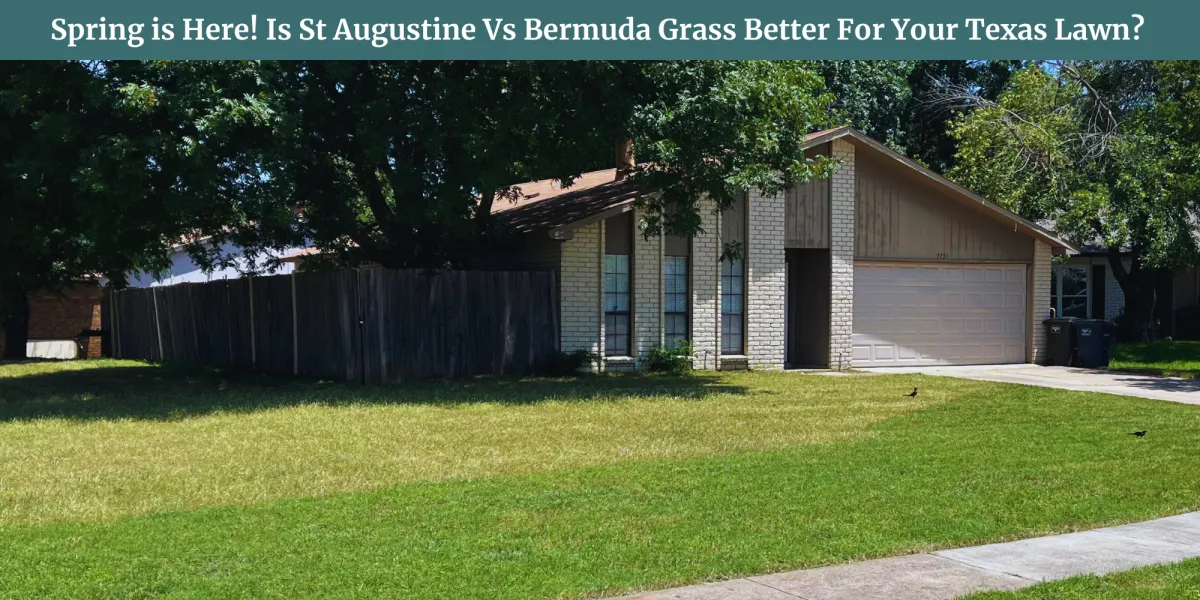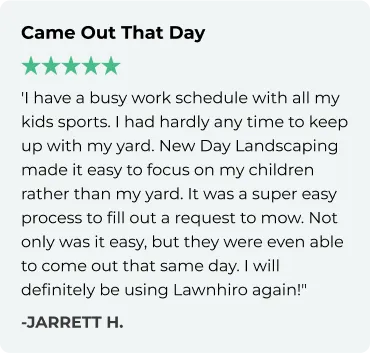
Spring is Here | St Augustine Vs Bermuda Grass Lawn Care
The Texas Grass Dilemma: St. Augustine vs. Bermuda
Spring is finally here in Fort Worth, and if you're like many of our clients, you're probably thinking about your lawn. As a local lawn care and landscaping company serving the Fort Worth area for over 8 years, one of the most common questions we receive is: "Which grass is better for my lawn - St. Augustine or Bermuda?"
Both are excellent warm-season grasses that thrive in our Texas climate, but they have distinct characteristics that might make one a better fit for your specific property needs. Having maintained over 100 local lawns with both grass types, I've seen firsthand how each performs in our unique Fort Worth conditions.
A big thanks to Rhett from the Lawn Insider for sharing his expertise in this informative video comparison between these two popular Texas grasses.
How to Tell Them Apart
Before we dive into the pros and cons, let's make sure you can identify what's currently growing in your yard:
St. Augustine grass features broad, coarse blades with a distinctive thick, carpet-like appearance. It spreads using stolons (above-ground runners) and creates a dense, lush lawn when healthy.
Bermuda grass has fine, thin blades and a more delicate appearance. What makes Bermuda unique is that it spreads using both stolons AND rhizomes (underground runners), giving it that aggressive spreading capability that can be both a blessing and a curse.
Mowing Height: A Major Difference
One of the biggest practical differences between these grasses comes down to lawn mowing height, which affects both maintenance requirements and aesthetic appeal.
St. Augustine needs to be kept tall, ideally between 3-4 inches. This is particularly important in our Fort Worth summers, where keeping it higher helps protect the root system from our intense heat. Many of our Tanglewood and Overton Park clients prefer this taller, lush look.
Bermuda grass thrives when cut short, around 1-1.5 inches. This creates that manicured, carpet-like appearance many homeowners desire. We've found this particularly popular with our Benbrook clients who want that golf course-like appearance.
Water Requirements in Fort Worth
Water conservation is a major concern here in North Texas, especially during our hot, dry summers. Here's what we've observed with our clients' lawns:
Bermuda grass is significantly more drought-tolerant, typically requiring about 1 inch of water per week to stay green. During our extreme July-August heat waves, it can even go dormant temporarily and bounce back when water returns. We've seen Bermuda lawns in Crowley survive with minimal irrigation even in 100+ degree weeks.
St. Augustine is thirstier, needing about 1.5 inches of water weekly to maintain its lush appearance. In the height of a Fort Worth summer, St. Augustine can quickly show stress with inadequate irrigation.
Shade Performance in Texas Landscapes
Many Fort Worth properties, especially in established neighborhoods like Overton Park and Tanglewood, have mature oak trees creating significant shade. This is where your grass choice becomes crucial:
Bermuda grass performs poorly in shade. I've seen numerous clients attempt to grow Bermuda under their live oaks only to end up with patchy, thin turf. If your yard has significant shade (more than 4-5 hours per day), Bermuda will struggle.
St. Augustine handles partial shade much better. It's not a full shade grass by any means, but it can maintain decent density with as little as 4-5 hours of filtered sunlight daily. This makes it the better choice for many of our wooded Fort Worth properties.
Disease Resistance in Our Climate
Our humid spring and fall seasons in North Texas can create ideal conditions for lawn diseases. Here's how these grasses typically perform:
Bermuda grass has impressive natural disease resistance. In our 8+ years serving over 100 Fort Worth homes, we've found Bermuda requires fewer fungicide applications and generally recovers faster from disease outbreaks.
St. Augustine is more susceptible to fungal issues, especially during humid periods. There's a reason some lawn pros call it "Saint Fungustine!" We've found our St. Augustine clients typically need more proactive disease management, especially in spring and fall.
Durability for Active Families
If you have kids, pets, or frequently entertain outdoors, this is an important consideration:
Bermuda grass is remarkably resilient to traffic. We maintain several youth sports fields in the area with Bermuda specifically because it can handle heavy use and recover quickly. For our clients with active children or dogs, Bermuda often proves to be the more practical choice.
St. Augustine can handle moderate foot traffic but doesn't recover as quickly when damaged. The stolons are more easily damaged than Bermuda's complex root system. That said, for average residential use, St. Augustine holds up adequately.
Year-Round Appearance
Fort Worth experiences relatively mild winters, but we do get cold snaps that affect our lawns:
Bermuda grass goes dormant (turns brown) earlier in fall and stays dormant longer into spring. While some of our clients don't mind this natural cycle, others find the extended dormant period unappealing.
St. Augustine maintains its color longer into fall and greens up earlier in spring. It's still a warm-season grass that will go dormant, but the dormant period is typically shorter in our Texas climate.
Our Recommendation for Fort Worth Homeowners
Based on our experience with over 100 local lawns, here's our general recommendation:
Choose Bermuda if:
Your lawn gets full sun (6+ hours daily)
You prefer a manicured, short lawn appearance
Water conservation is a priority
You have active children or pets
You don't mind winter dormancy
Choose St. Augustine if:
Your lawn has partial shade areas
You prefer a lush, thick appearance
Water cost isn't a major concern
You want extended green periods in spring/fall
Your property has minimal foot traffic
Remember, the "best" grass ultimately depends on your specific property conditions and personal preferences. At New Day Landscaping, we're always happy to provide a free consultation to assess your lawn and make personalized recommendations.
Have questions about your lawn care needs? Contact us at (817) 760-0479 or visit our website at www.newdaylandscaping.net to learn more about our comprehensive lawn care services throughout Fort Worth, Benbrook, Crowley, and surrounding areas.




